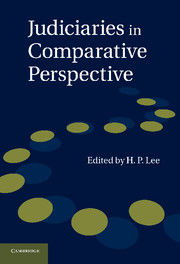1 - Judicial independence and accountability
core values in liberal democracies
from Part I
Published online by Cambridge University Press: 07 September 2011
Summary
The study of judicial independence is important in national legal systems as it is an essential guarantee for democracy and liberty. Judicial independence is also an essential feature in ensuring a globalised economy. Corporations must have confidence in the impartiality and independence of the tribunals that will adjudicate disputes in the multiple jurisdictions in which they operate around the world.
Recent decades have witnessed a marked increase in the relative role of the judiciary in society. This general trend is shared by countries with different legal traditions and various systems of government. The judiciary is a significant social institution, and like the other branches of government, contributes to shaping the life of the community. The increasing role which the judiciary has assumed warrants some re-examination of the conceptual framework and the theoretical rationales which define its position in relation to the other branches of the government. One of the most significant aspects of the role of the judiciary in society is its independence and impartiality.
- Type
- Chapter
- Information
- Judiciaries in Comparative Perspective , pp. 3 - 24Publisher: Cambridge University PressPrint publication year: 2011
References
- 7
- Cited by



